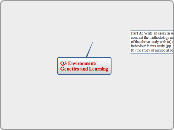af Joerg Bauer 15 år siden
385
Environment vs Genetics
In comparing the methodologies and conclusions of the provided study with those of the research on maternal behavior in rats and antisocial behavior in humans, several key points emerge.

af Joerg Bauer 15 år siden
385

Mere som dette
Environmen over Genetics
Behaviour is familial but environmentally not genetically determined
2. Enriched Environmen StudyEnvironment even changes DNA
1. Nursing Behaviour StudyEnvironment is determinant
Weaker Genetic Determination over environment
MOAP and Child abuse Study
Strong Genetics determination over environment
Huntington's Disease Book 1 1.1.3
Narcolepsy: Book 1 2.3.5
1.c) Genetics affect adult violence significanly more in cases of strong infant abuse (Environment)
1.b) Severe chilhood abuse (Environment) affects antisocial behaviour
1.a) Genes themselves do not cause anitsocial behaviour
Long Term Study analysing the relationship between genetic factors, childhood environmant and and an index of antisocial behaviour:Independent Factor 1: Mutant MOAP alleleFactor 2: no abuse, mild abuse, strong abuseDependent variable: agresive behaviourHypothesis: Greater correlation between MAOP+childhood abuse and violent behaviourcompared to No MOAP +childhood abuse / MOAP+ No child abuse
Similar: Genetics determine aggessive behaviour only in few cases
Differnt: Experimental vs. Correlational Study
3. Conclusions of 2nd eperiment: Maternal Benhaviour runs in families but is not genetically determined
2. Environment during infancy primary determinant of open field behaviour
1.Maternal behaviour towards children (no matter if foster or not) determines open field behaviour
2. Experimenta Set upIndependent Variable: High-Low nursing environmenDependent Variable: High Low later maternal behaviour
1.Experimental Set-UpIndependent Variable: Nursing Behaviour of MothersDependent Variable: Open field Behaviour of children
Same, but additionally infacny Environment (of Mothers) can not only change behaviour, but even DNA
Same
4. Effect is not long lasting
3. Evidence for Epigenetics: Environmentally in infancy can even change the DNA
2. Mothers aquired improvements affects childrens DND
"An otherwise latent control mechanism is unlocked" by which LTP is enhanced
1. As previously shown: Enriched environment during infancy can improve genetic defects
Experimental Set.Up:Independet Variable: Enriched envrionment in mothers Dependent Variable: Memory function of their offspring
5: Memory is enhanced in spite of genetic defect
4. Offspring: No enriched environment is provided
3. Offspring with same genetic defect:
2. Exposing them to enriched envrionment
1. Genetic Manipulation: Built in Defect of Memory of future mothers